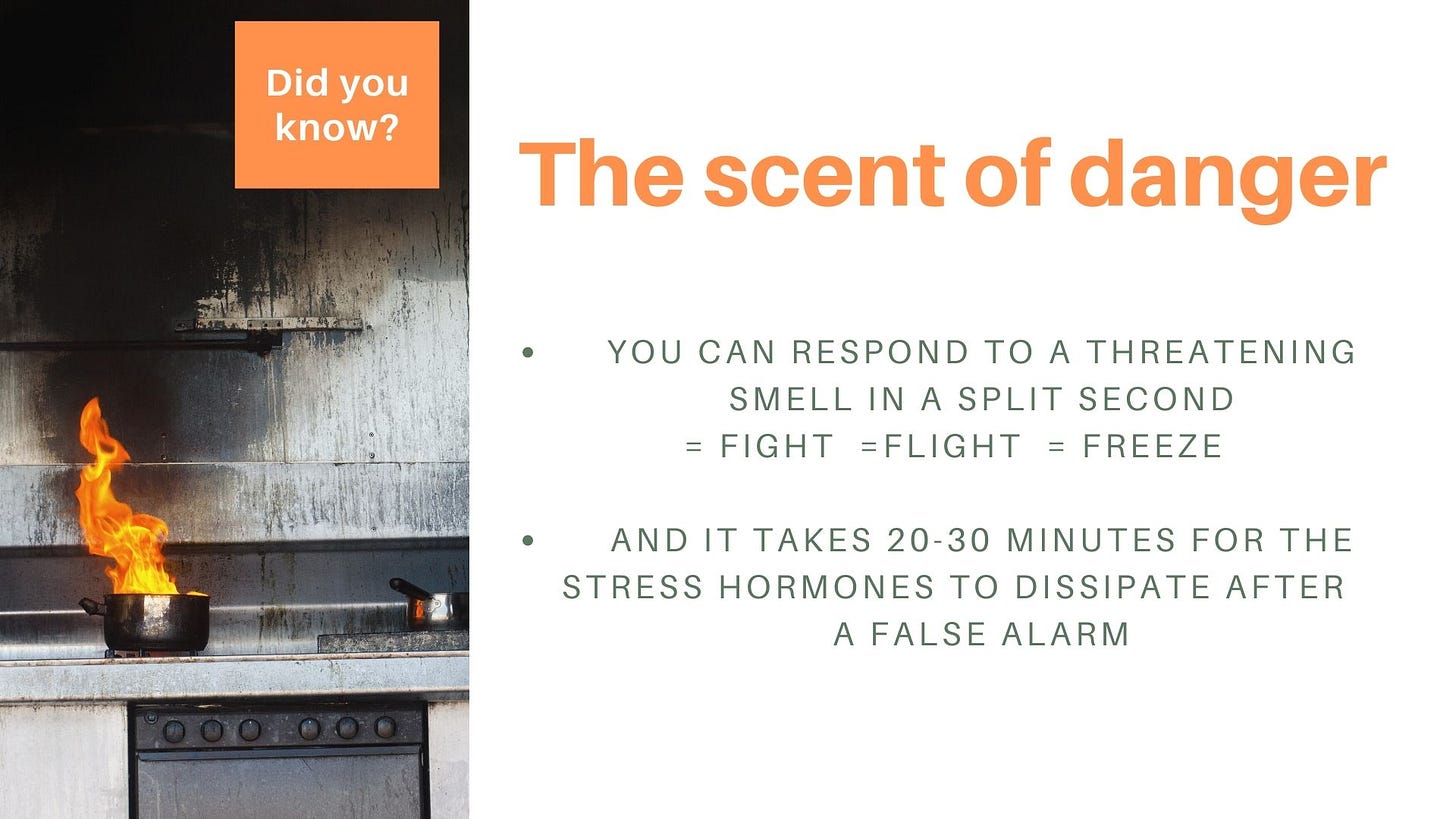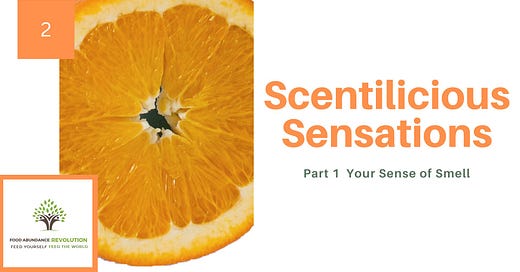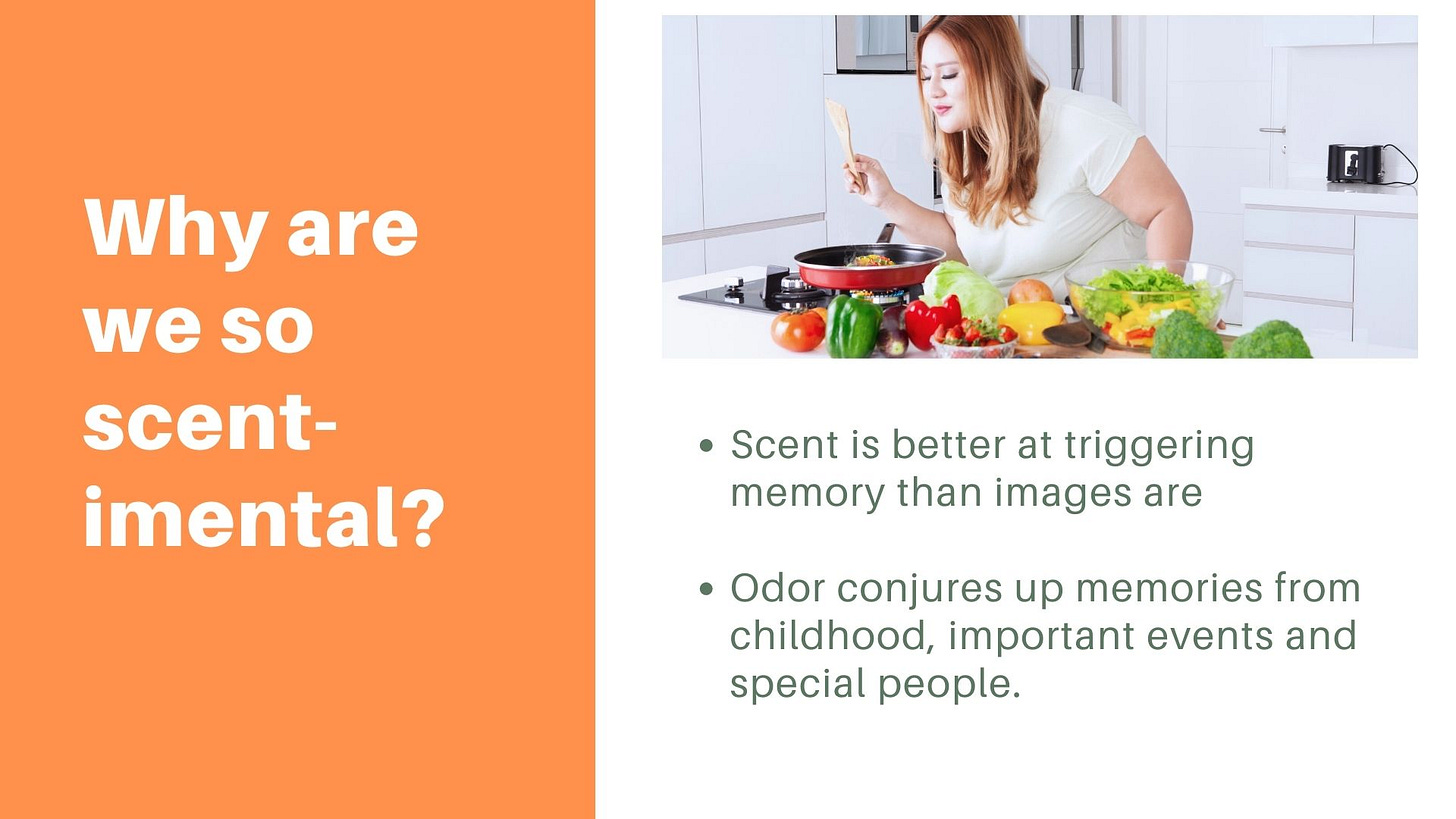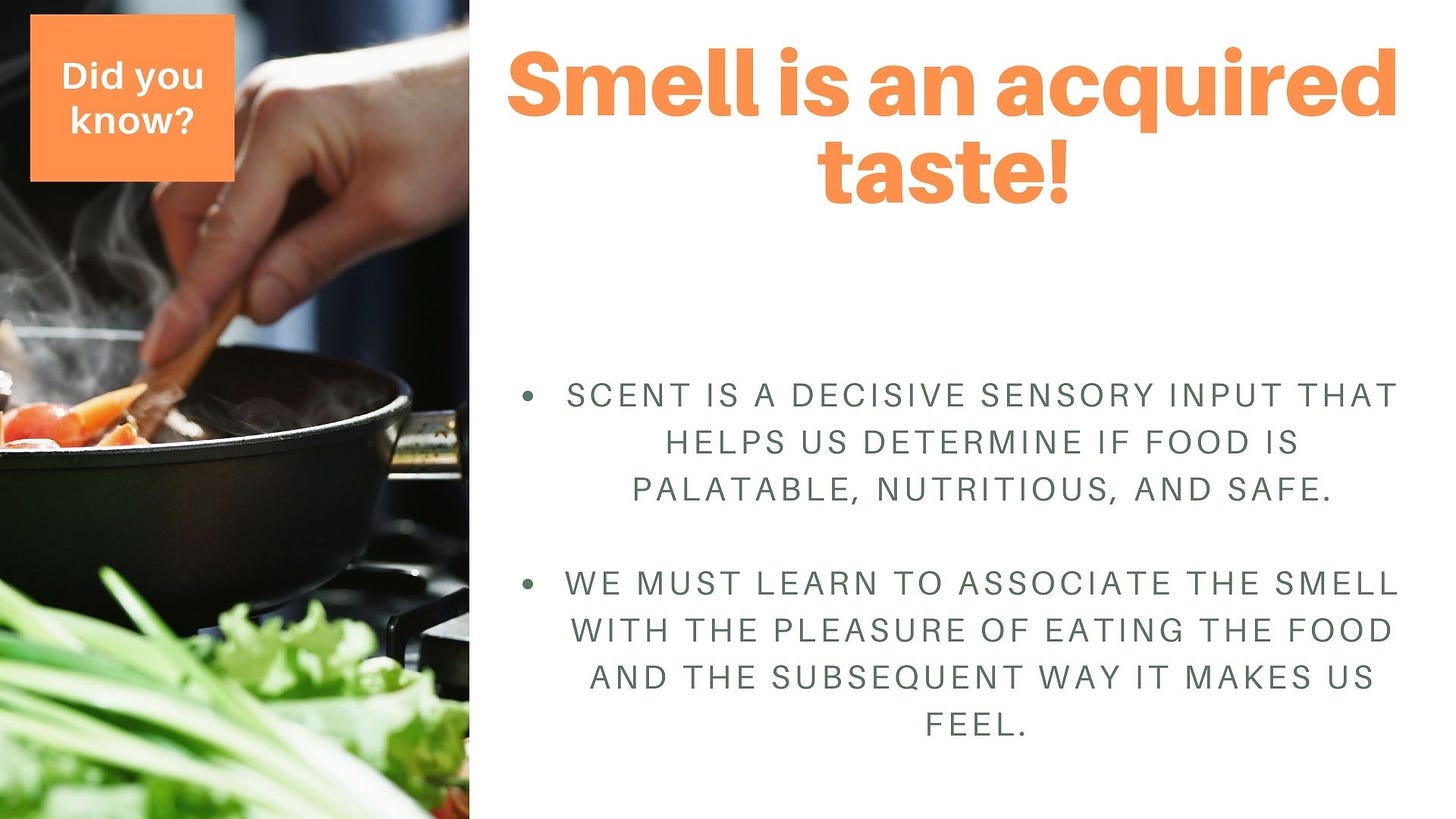Scentilicious Sensations: How Your Sense of Smell Affects Your Mind-Body-Food Connection
Part 1: Your Nose Knows Faster Than You Think
Your sense of smell is the second section of a 5 part series on your senses and the Mind-Body-Food Connection. Below is the overview so you know where you are in the process, and in case you missed the first of the series on eyes.
Your Senses
Starting this week (May 22, 2023), I will be rolling out the first of a five-part series on Your Senses in The Mind-Body-Food Connection. In each section, I have been researching and examining how each of our senses affects our Mind-Body Connection in relation to Food:
Section I: The Eye of the Beholder (your sense of sight)
Eyes - Part 1: Your Mind-Body-Sight-Food Connection
Eyes - Part 2: The Manipulation of How Food Looks
Eyes - Part 3: How Nature Can Re-set Your Mind-Body-Food Connection Through Your Eyes
Section II: Sentilicous Sensations (your sense of smell)
[YOU ARE HERE] Nose - Part 1: Your Nose Knows Faster Than You Think
Section III: Sound and Silence (your sense of hearing)
Section IV: Our Tactile Tendencies (your sense of touch)
Section V: Taste the Wonder (your sense of taste)
To get access to all the components of this series, you will need to become a paid subscriber.
Okay! Let’s dive into your sense of smell.
Human behavior is largely motivated by two competing factors: achieving pleasure and avoiding pain. Scents play a surprisingly large role in our pursuit of these factors. In this scent-oriented section of the Mind-Body-Food Connection, I am going to walk your through how smell influences your mind and body, and some important scent triggers that affect your relationship with food.
Let’s dive in!
Right Under Your Nose
Your ability to smell things (olfaction) is the result of a highly complex sensory system that includes your nose, mouth and brain. Scent particles are inhaled through your nose and are picked up by specialized sensory neurons (called olfactory sensory neurons) high up in the nasal cavity.
Each one of these neurons has odor receptors to detect those inhaled particles. Your nose has something like 6 to 10 million olfactory sensor, which sounds totally impressive until you realize that a dog has over 100 million of these sensors in its nose. So our sense of smell as humans, while weak compared to a dog’s, is still all we have to get by in the world.
When you inhale a scent particle it causes the sensory neurons to fire. They send signals to your brain which is where the smell becomes identified. You learn through experience what a smell is actually connected to. Odors are processed in the limbic system of the brain, which includes the amygdala and the hippocampus, the regions related to emotion and memory.
Your sense of smell is not limited to your nose!
The other way that smell is triggered is through special receptors in the roof of your mouth. These neurons are activated when you eat food.
Your sense of taste and smell are tightly linked. Without smell, many foods would taste bland or simply all taste the same. You may recall that one of the symptoms of Covid-19 was the loss of smell, which also then affected patients’ ability to taste.
Despite operating at only 10% of the odor sniffing capacity of a dog, human noses are still surprisingly sensitive to odor particles. A 2014 study published in the journal Science revealed that the human nose can identify over 1 trillion scents! That’s much more than previously thought.
It turns out that most odors are a mixture of different components. The ratio of one component to another can vary, much the way that pink is a shade of red. For example, a familiar scent like “rose” is actually made up of 275 chemical components that blend together and allow for an incredible nuance of fragrance that are still all “rose” scents. As science unravels what these component chemical signatures are, humans have been increasingly able to manufacture specific artificial smells that are hard to distinguish from the real thing (more on why this matters this in part 2).
Why are we so “scent-imental”?
It turns out that scent is better at triggering memories than images.
Nothing brings up childhood memories faster for me than the smell of freshly baked bread. My mother made our bread from scratch each week, and that delicious smell is deeply engrained and linked to a sense of home and wellbeing for me.
Odor memories are powerful. Just thinking about that “new car scent” can take you right back to a special car you bought or took a test drive in. Catch of whiff of a favorite perfume or cologne and you are immediately reminded of your favorite person who wears it.
For me, the smell of roses is deeply linked with my father. He loved the flowers and would have me smell one type and then another as we walked in rose gardens over the years. One of the reasons that I bought the farm that I now live on (and named it Rose Hill Farm) was because of all the heirloom rose bushes on the property. It’s easy for me to imagine how much my Dad would have loved this place. Because scents are processed in the memory and emotion parts of our brains, odor not only affects our memories, but it has a strong influence over our behavior as well.
Your Brain On Scent
Scents don’t just remind you of the past, they can significantly affect your mood in the present.
Aromatherapy is a well-known natural healing method that uses scents to enhance physical and psychological wellbeing. While exposure to mint, citrus and cucumber scents elicit a sense of freshness and can raise your spirits, unpleasant odors can immediately cause your stress levels to rise.
Physical responses to scent include changes in your heart rate, blood pressure, cortisol and serotonin levels. Cortisol is a stress hormone, so if you find a scent that relaxes you and calms you down, this can result in physical changes to your cortisol levels which in turn can help you manage stress over longer periods of time. Similarly, serotonin is a neurotransmitter that affects your mood, but also your sleep, digestion, wound healing ability, blood clotting ability and sex drive. Lavender, bergamot and lemon can all increase your rate of serotonin release, leading to both emotional and physical benefits. Finding scents that work for you is definitely worth the effort.
Using scents is considered to be complementary to other medical treatments. Essential oils derived from plants can reduce anxiety and pain, as well as deliver anti-microbial, anti-septic and anti-cancer effects.
And while this series is focused on human wellness, the benefits of essential oils carry over to other living creatures too. I use essential oils on the farm for my chickens to improve their wellness and to reduce the impacts of various pathogens. More and more these powerful plant compounds are being recognized for the positive impacts on animal health and wellness with fewer side effects compared to drug or chemical treatments. Just remember that, whether for human or animal use, essential oils should always be properly diluted.
The Scent of Danger
You may recall from The Eye of the Beholder- Part 1 that I briefly talked about our survival response system of fight-flight-freeze. Odor can be a powerful trigger for our stress response.
Just think how you feel when you smell smoke but you can’t identify the source.
Scary right?
Smoke is a scent that creates alarm in us. We associate that smell with immediate danger and go on high alert. Even if it’s a false alarm, we stay on high alert for 20-30 minutes after because the stress hormones continue to circulate in our system.

What other kinds of odors make us back off?
How about the smell of rotten eggs? Skunk odor? Bad body odor – you know the kind that rankles your nose? And even the smell of disease. Yes, disease!
Did you know that your body launches an automatic immune response to disgusting smells?
Bad odors are often associated with danger and increased risk of disease (think: rotting food or infected wounds). What you do next after detecting a bad odor may influence whether you survive or not.
Bad odors make us turn away and leave, which is an important response to potential danger (flight!).
A small study (36 healthy participants) published in the journal Evolution, Medicine and Public Health (2023) measured the salvia response of test subjects when presented with disgusting smells. The researchers showed that these bad odors triggered immune-response chemicals to be released in the mouth of test subjects.
This study supports a growing body of evidence that suggests our noses not only detect potentially harmful odors associated with sickness and disease, but that detection triggers our oral immune response.
Why would our mouths respond this way to a disgusting smell? The theory is that this mouth immune response increases our sensitivity to bitter taste, which in turn makes us less likely to consume something harmful. Thus, a disgusting smell changes the chemicals in your salvia to make you avoid eating something bad and to rev-up your immune system for a fight against disease pathogens.
Smell is an Acquired Taste
Luckily, our sense of smell also teaches us what is delicious and wonderful to eat!
You may not even realize it, but you nose helps you determine what is edible, fresh and nutritious with just one good whiff of some food.
But this knowing comes from past experience. It comes from linking a scent to the taste that comes next and storing that in our memories for instant recall. We learn what good food should smell like, and it’s this memory process that helps us survive. We can maximize our food value by choosing ripe (vs unripe) fruit, avoiding greens that smell sour, choosing the aromatic fresh bread over stale old bread, and so on.
As we gain this knowledge over time and with practice, the memory of the “good food smell” also links up with our reward center in our brain. This dopamine hit (the feel good hormone) creates pleasure associated with delicious tasting and smelling food, and with the satisfaction we feel when we are full after eating it.
Thus, smell is extremely important to our experience of food.
It also turns out that both pathologically underweight and overweight individuals both suffer from decreased olfactory responses. And these decreased responses were seen to improve when the underweight patients gained weight and when overweight patients lost weight.
Although there are few studies available that explain why this relationship between your sense of smell and body weight exist, we do know that olfaction is “strongly influenced by hormones and nutrients which regulation is profoundly altered in the context of obesity” (2022). It may also be because decreased olfaction interrupts the normal signals of feeling full and satiated, which thus leads to eating more food (2021).
Our Ancient Brains On Scent
Our ancient patterns are still hard-wired into our brains. We may have stopped noticing, but that doesn’t change the reality of how we live as humans on this planet. In the context of modern life, we become habituated to the smells of the city, the smells of industry, to the stuffiness of indoor air.
But luckily every day we need to eat, and so every day we have the opportunity to re-connect to our deepest human need to secure our food. And our sense of smell is ready to help us.
Why not pause today, before you dive into your next meal and simply smell that delicious goodness? Take a long, slow, deep inhale of whatever it is and savor that scent for a moment or two before you start eating.
Or just hold that cup of coffee for a moment longer and breathe in the familiar smell. Let your body anticipate how good that sip is going to be.
Our sense of smell helps us stay safe in the world. It helps us identify the best foods to eat. The scent of fresh water can lift your spirit in an instant. The use of essential oils can not only change your mood, it can change how your body is functioning. Detection of a bad smell is likewise keeping you safe, and telling you to avoid that place. Listen! These are fundamental connections between your highly evolved senses and your need to survive.
There are so many parts of being human that we simply just forget about as we move through the grind of earning a living. Your sense of smell can carry you back to childhood. It can vastly increase your enjoyment of a meal. It can revitalize your wellbeing.
Think about that as you go about your day today. What smells are influencing you?
And for heavens sake, stop and smell some roses!
What’s Next?
In part 2 of Scentilicious Sensations, I will walk you through the trends in the food industry over the last few decades and how our increasing knowledge of scent is being purposefully exploited to manipulate us into bad food decisions. Once you look at these tricks, you won’t be so easily fooled again.
And then stay tuned for part 3, because that is where we will look at how you can re-set your Mind-Body-Food Connection using the scents of nature. You can re-train your brain into appreciating real, healthy, natural foods. I’ve got a few ideas you can try!
Be sure to Subscribe and get the whole story.








